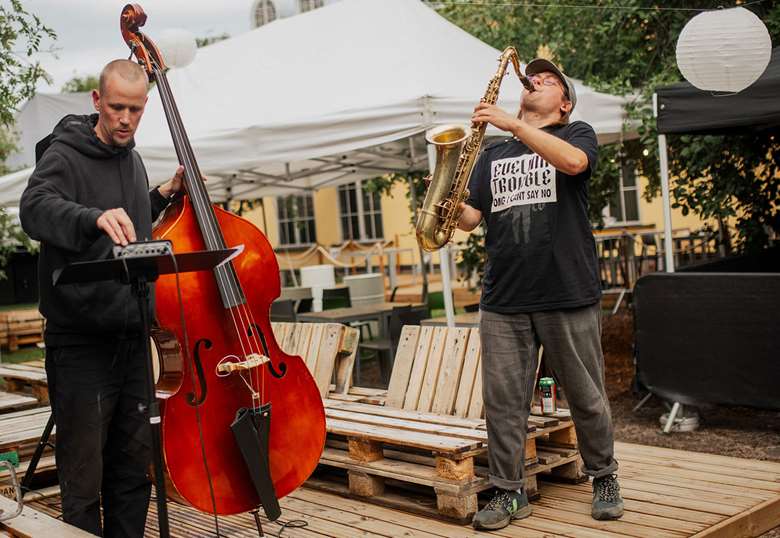Jazz and a vivid palette of improv at Helsinki’s Odysseus Festival
Wif Stenger
Friday, July 26, 2024
Nordic jazz and startling Asian improvisation at an old tram depot from 1900

In the garden courtyard, the sun came out after a thunderstorm – and so did the Swedish duo of bassist Petter Eldh and saxophonist Otis Sandsjö, offering a playful acoustic set. Other planned garden gigs were moved onto three indoor stages, an option that Odysseus Festival didn’t have in previous years on a windy Finnish island.
The two-day event is organised by the We Jazz collective, which also stages a winter festival. Odysseus served up a wide palette of jazzy, folky and experimental music from around the world and showcased the first artists on We Jazz’s experimental new label, Other Power: Kenyan electronic artist KMRU and Finnish vocalist Islaja, along with Australians Oren Ambarchi and Will Guthrie.
Day 1 spotlighted local jazz, starting with keyboardist Olli Ahvenlahti, whose 70s funk-jazz LPs have been rediscovered by cratediggers and samplers.
Trumpeter Verneri Pohjola played tunes from his latest Monkey Mind, ranging from a breathy duet with drummer Olavi Louhivuori to harrowing, strangled sounds and a guttural electric guitar effect. Danish bassist Jasper Høiby kept a low profile, while Tuomo Prättälä added soulful organ. He and Louhivuori are crucial cogs of the Helsinki scene and well worth catching if you can. Most poignant was the ballad “Save This One for When You Need It”. On the album it features baritone saxophone by Linda Fredriksson, who didn’t appear onstage but whose influence was present.

Fredriksson took the main stage later with Louhivuori and his quartet Superposition (above), unveiling pieces from their new second album. Fredriksson and fellow saxophonist Adele Sauros breathed into their horns from opposite sides of the stage, sending waves washing across the room.
The violin and flute-driven Ainon previewed their second album. Their whimsical chamber jazz suggests an edgier Penguin Café Orchestra, its pastoral moods were disrupted by Milo Linnavaara’s clarinet and bursts from drummer Joonas Leppänen. He also played a screeching, cymbal-scraping free jazz duo with Amsterdam saxophonist Marcus Wärnheim.
Day 2 was devoted to sounds from around the world and the edges of jazz, folk and classical. Spanish guitarist Victor Herrero’s charming set touched on all those, along with flamenco and bossa nova. Palestinian singer and oud player Kamilya Jubran delivered a stark, spellbinding set. Even without understanding her lyrics, the anguish and bleak beauty they conveyed was clear.

The day’s most stunning performances were by Asian artists. Mongolian jazz singer-songwriter Enji (above) cites Carmen McRae and Nancy Wilson as influences, but that’s not readily apparent in her utterly distinctive sound. She’s more akin to ex-jazzer Björk and Lebanon’s Yasmine Hamdan. Enji’s wonderfully warm voice tends toward slow, soaring vocalise, between scat and the yoik vocals of the indigenous Sámi. Backed subtly on guitar and bass, she showcased songs from last spring’s Trio Session and a new tune written at a cabin in Finland.
The weekend’s most extraordinary improv was by Ustad Noor Bakhsh from Pakistan’s Balochistan region. At 78, Bakhsh looked frail as he sat down cross-legged onstage. Age was instantly forgotten, though, as he began to play his electric benju, a keyed zither.
It sounds like an electric guitar but with melodic lines that move in unpredictable, appealing Pac Man-like squiggles. He was accompanied by two droning tambouras, with Daniyal Ahmed also playing a flute “played by yogis, mystics and wanderers” that suggested an Irish whistle.
Drawing on qawwali, Persian, Kurdish and Bollywood tunes, the trio’s polyrhythmic improv conjured up desert blues, Dick Dale’s “Miserlou” and Fairport Convention’s “A Sailor’s Life” – maybe not far off, considering Richard Thompson’s devotion to Sufism. Afterwards, my brain felt reprogrammed – and ready to listen with new ears.


